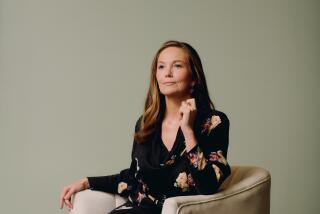For Diane Lane, a lighter moment of ‘Cinema Verite’ touched her
- Share via
It’s telling, perhaps, that when asked what she likes best about her performance in the HBO Films dramatization of the making of the landmark 1973 PBS documentary “An American Family,” Diane Lane cites “the swimming pool scene” in “Cinema Verite.”
It’s a bit of improvised horseplay in the pool at the Loud family’s home in Santa Barbara that captures nothing more significant than a happy moment in time. Lane, as matriarch Pat Loud, gets pushed into the pool, where she frolics, indignant but laughing, with her five teenagers and husband Bill (Tim Robbins). “I’m so shy about improvising — it brings up all my insecurities — but that was fun,” Lane says during a recent interview at a Beverly Hills bistro.
The scene from “Cinema Verite,” which re-creates the chronicling of one family’s life, essentially becoming the nation’s first reality TV program, plays as a few seconds of footage that her character watches with documentary producer Craig Gilbert (James Gandolfini) after she’s challenged him about what he’s up to and whether she wants to go forward with the project at all. Seeing its innocent depiction of the family, she relents.
The real fireworks, and Lane’s strongest scene, take place later — after Gilbert shows up to film a moment Pat explicitly forbade him to, in which she explains to her brother why she’s about to end her 20-year marriage, shortly after breaking the news to her children. “What about the threshold of privacy?” she demands in a heated confrontation with Gilbert. “There’s real suffering happening here, Craig. You should have seen my kids last night!” About to lose his movie after seven months of filming, Gilbert counters: “What about all the women who are in the same position as you are right now — they’re lost, and they don’t know what to do, and you can show them!”
More than anything, that seems to change Pat’s mind. The conversation gets filmed, and Gilbert is right — the family’s story wouldn’t have made sense without it. Many actresses might have wanted to call attention to an exchange as dramatic as that one, but Lane seems most comfortable keeping the focus on the message “American Family” conveyed at a time when things were very different for women.
“People forget what things were like in 1971 — so many things that we take for granted now weren’t even thought of yet,” she says. “The birth control pill wasn’t there for a lot of women of that generation. Roe v. Wade hadn’t even been passed. There are so many things to let go of when you do a period piece like this.
“For Pat, who went to Stanford but then got caught up with having kids, to have the whole world have an opinion on your divorce — there was no precedent for that. And everyone wanted to know what drove her to the brink, and why she said yes to the cameras.”
A lot of the explanation came in the candid 1974 autobiography “Pat Loud: A Woman’s Story,” which Lane relied on as “the bible” for her portrayal, along with the original 12-part PBS series. She didn’t seek to meet Pat Loud — who now lives in Los Angeles, together once again with Bill — “out of respect,” says the actress, who at 46, is the same age as Pat was during the original documentary. “I felt that family had been through enough. I didn’t want to put her through raising the Titanic again for my sake.
“I understand how fame can be an invasion,” says Lane, who at age 14 landed on the cover of Time magazine for her first movie, “A Little Romance.” She’s gone on to dozens of roles, including 1989’s “Lonesome Dove,” which brought her an Emmy nomination, an Oscar-nominated turn in 2002’s “Unfaithful,” and the recent “Secretariat.”
Lane eventually did meet Pat Loud, whom she considers “an amazing woman and the missing link in the feminist movement” at the movie’s premiere in April. “She was so gracious, and she gave me what I was looking for, her blessing, which was a huge sigh of relief for me,” says Lane.
She empathizes with the family’s ordeal in 1973, when the barrage of attention that greeted “An American Family” included much hostility and criticism.
“We can’t undo or change anything that happened,” Lane says. “But we can offer the perspective of our time, a perspective that didn’t exist then.”
More to Read
The biggest entertainment stories
Get our big stories about Hollywood, film, television, music, arts, culture and more right in your inbox as soon as they publish.
You may occasionally receive promotional content from the Los Angeles Times.










